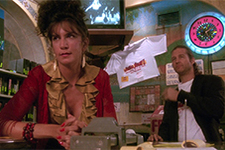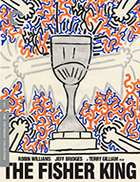The Fisher King (4K UHD)
|  Although it bears many of his stylistic and thematic hallmarks, The Fisher King was unlike anything director Terry Gilliam had made before. It was written by a young, then unknown Richard LaGravenese, and Gilliam had never directed a script that he had not had a hand in writing. It featured not a single member of Monty Python, the British comedy troupe for which Gilliam had written sketches and supplied animation in the late 1960s and early ’70s. And, perhaps most interestingly, it was his first film not to take place in a fantastical imaginary world. Rather than unfolding in a fictional medieval realm like the ones in Monty Python and the Holy Grail (1975) and Jabberwocky (1977), or the intersection of fantasy and history we saw in Time Bandits (1981), or a retro-futuristic dystopia like the one in Brazil (1985), The Fisher King takes place right in the heart of New York City in the late 1980s. We are introduced to the film’s protagonist, a narcissistic radio shock jock named Jack Lucas (Jeff Bridges), in the dark, claustrophobic confines of his recording studio, where he blares his unique (and popular) brand of jaded, misanthropic entertainment. Gilliam and cinematographer Roger Pratt (who had also shot Brazil) only show us Jack from extreme high angles looking down on him or in extreme close-ups of his mouth, which makes him feel even more distant and unpleasant—a truly vile human being shouting at the world. And, as it turns out, his words are not without impact, as his casually violent diatribe against yuppies inspires an actual mass slaughter at an upscale Manhattan watering hole, a tragedy that Jack learns about on television the night before he is set to audition for a sure-to-be-hit sitcom. Fast-forward three years, and Jack’s star has fallen far and fast. No longer stroking his ego in a massive Manhattan loft and practicing lines for his sitcom, he is a nervous wreck, a pale shadow of his former self, hovering in the apartment above a video store owned and run by Anne (Mercedes Ruehl in an Oscar-winning role), his tough but loving (and long-suffering) girlfriend. Drowning in roughly equal amounts of alcohol and self-pity, Jack attempts to end it all, and in the process crosses paths with Parry (Robin Williams), a mentally ill homeless man who fancies himself a knight questing after the Holy Grail, which he believes is being held in the enormous mansion of an Upper East Side millionaire. Parry—his name is both a play on the Arthurian knight Parsifal and the sword-fighting move—is all buoyancy and life, even though he is clearly not in touch with reality, which makes him the polar opposite of Jack’s moping fallen star. When Jack learns that he and Parry have a very real connection in their pasts, he decides to try to help him, primarily as a way of relieving his own sense of guilt and maybe finding some kind of redemption. However, what makes The Fisher King a particularly intriguing and engaging film is that it doesn’t settle for the simplicities of obvious redemption for its caddish protagonist, a narrative trend that has always been popular, but was particularly so at the box office in 1991 (to wit, Doc Hollywood, Life Stinks, Regarding Henry, and The Super). No, Jack’s trajectory is much more challenging than that, as he and Parry develop a unique relationship of oddball camaraderie and, as it turns out, mutual redemption and healing. At one point Parry relates to Jack the myth of the titular fisher king, the primary characters of which are a greedy and fallen king and a simple-minded fool. It is easy to read Jack as the fallen king and Parry as the fool, but both characters share traits of the two archetypes: Jack ultimately becomes the fool who seeks to quench Parry’s metaphorical thirst, first by helping him to romance a shy, socially awkward office worker named Lydia (Amanda Plummer) and later by retrieving the fabled Grail, while Parry is revealed to have once been a king in his own right whose fall is even worse than Jack’s. The Fisher King was Gilliam’s first film since the disastrous The Adventures of Baron Munchausen (1988), which had gone millions of dollars over-budget and flopped terribly at the box office. Gilliam had previously wrangled with a major studio over the final cut of Brazil, and the two films together had made him almost unemployable in Hollywood. At first glance The Fisher King would seem an unlikely project for the director, especially since he had become so identified with special-effects-heavy fantastical satires, but in hindsight one can see that he was an inspired choice. Reeling from the disaster of Munchausen, Gilliam was looking to do something on a smaller scale, and The Fisher King, despite its references to the Arthurian legend and flashes of the fantastical, is primarily a four-character drama, much of which unfolds in cramped interiors (the grand glass-and-steel space of Jack’s Manhattan loft is quickly replaced by the tight, low-ceiling confines of Anne’s small apartment, the claustrophobic video store, and the overstuffed boiler room in which Parry lives). One of the film’s loveliest scenes, which charts the evolution of a double date from awkward to wonderful via a locked-down camera and a series of wipes, is one of the best moments in all of Gilliam’s films. Although it is really a chamber drama of sorts, Gilliam imparts on The Fisher King his unique visual sensibilities; his one major addition to the script is a scene in Grand Central Station where Parry follows after Lydia through a dense crowd that suddenly begins to pair off and waltz around him. It’s a moment of magical realism that temporarily relieves us of the congestion and squalor of the big city. For Gilliam, the city is largely horrific and dangerous, and his visual emphasis is constantly on the physical constriction of the concrete jungle. The first visual we get of New York is a high-angle shot looking straight down at a traffic jam of taxi cabs in a tight street wedged between massive skyscrapers, and most scenes in the city are choked with garbage and trashcans and locked metal doors. When the film moves out into the open expanse of Central Park, you might breathe a sigh of relief. Despite being one of Gilliam’s most broadly popular films (we can probably thank the star presence of Jeff Bridges and Robin Williams for that), The Fisher King is not in any sense any easy film, despite its obvious trajectory toward a redemptive happy ending—something that had been largely lacking in his previous efforts. The film’s tone shifts frequently, moving from broad physical comedy, to intense emotional drama, to surreal fantasy. Parry often sees a frightening, flame-spewing Red Knight on horseback whose strange physical manifestation is later explained in a disturbingly gory flashback. The Red Knight is just one of the film’s numerous allusions to myth and fantasy, and it is clear that Gilliam and LaGravenese want us to see it as a modern incarnation of the hero’s journey. The film’s depiction of mental illness veers from the intensely real to the obviously fictional, and its ending suggestion that incapacitating psychological trauma can be healed by another’s selfless deed is somewhat problematic in this respect. But, the film as a whole weaves a uniquely intriguing web, balancing emotional realism with highly stylized artifice in a way that Gilliam has been largely unable to reproduce since.
Copyright © 2023 James Kendrick Thoughts? E-mail James Kendrick All images copyright © The Criterion Collection | |||||||||||||||||||||||||||||
Overall Rating: 


 (3.5)
(3.5)


